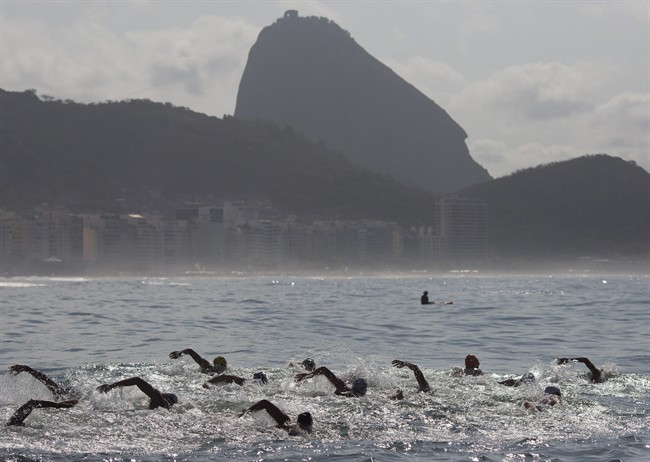RIO DE JANEIRO — Olympic organizers have agreed to test for viruses in Rio’s sewage-filled waters.

But even if they find high virus counts, organizers say they have no plans to move venues.
Why isn’t there more pressure to move? Olympic athletes have little clout, some sports don’t have alternate venues, and sport federations have deep financial ties to the International Olympic Committee.
Carlos Nuzman, head of the Rio organizing committee, promised Tuesday to introduce viral testing, saying the most important thing was “the health of athletes.”
Most athletes, however, have remained quiet, even after The Associated Press released a five-month independent study showing high levels of viruses at Olympic venues for sailing, rowing, canoeing, triathlon and open-water swimming. About 1,400 athletes will compete in the hazardous waters.
READ MORE: Olympic teams to swim, boat in Rio’s filth: AP Investigation
American Alex Meyer is among the few who have spoken out. A 2012 Olympian and former world-champion distance swimmer, he wants the open-water venue moved from Copacabana Beach. He did not qualify this year, and feels free to speak.
“I totally support moving it,” Meyer told AP. “This is a little bit of a window into why, on many fronts, the Olympic athletes feel like they are just pieces of meat. They (IOC) don’t care if we are comfortable or safe. They’re just putting on a show and we are replaceable.”
There is no short-term solution to get rid of contamination before the Olympics open Aug. 5, 2016. The contamination is a public health crisis that could take decades to resolve, requiring that millions of homes in hillside slums are hooked up to treatment plants.
Here is a look at the obstacles to moving the polluted Rio venues:
NO UNION
- B.C. to ban drug use in all public places in major overhaul of decriminalization
- 3 women diagnosed with HIV after ‘vampire facials’ at unlicensed U.S. spa
- Solar eclipse eye damage: More than 160 cases reported in Ontario, Quebec
- ‘Super lice’ are becoming more resistant to chemical shampoos. What to use instead
Olympians lack a union and a single voice among more than 200 nations and 10,500 athletes.
Instead, they are largely associated with federations that govern each individual sport, and national Olympic committees.
READ MORE: Sailing official threatens to move Rio Olympic sailing from polluted bay
Many athletes have participated in test events last month and did not get sick, and believe the risk is overstated. Others say they are willing to risk becoming ill for what may be the biggest event in their careers.
FINANCIAL TIES TO THE IOC
Many sports federations, particularly the smaller ones, depend financially on the IOC. Peter Sowrey, the CEO of the sailing federation ISAF, said 50 percent of the organization’s annual income comes from the IOC.
Simon Toulson, the head of the International Canoe Federation, said smaller federations fear being booted from the Olympics.
“It’s not easy for a small sport like ourselves,” Toulson told AP. He said any negative coverage is “not great for us.”
There has been some concern expressed by federations, but not a huge outcry. None of the federations involved in water sports is interested in moving venues at this time. They have pressed local organizers behind the scenes instead to clean up the water, a job that falls to the government.
COMMERCIAL BENEFITS
Rio’s sewage-filled venues look beautiful – from a distance. Guanabara Bay is framed by Sugarloaf Mountain, and the Rodrigo de Freitas Lagoon sits under Christ the Redeemer statue. Copacabana Beach is a world-famous landmark.
Sports federations hope stunning TV images will drive interest in relatively niche sports.
READ MORE: Series of stabbings near Rio de Janeiro’s Olympic areas has city on edge
US television network NBC paid $4.38 billion for the rights to four Olympics: 2014 through 2020. Last year it said it would pay $7.75 billion for the rights to a package of six more games, beginning with the 2022 Winter Olympics.
Sailing and rowing often compete on the fringe, but they’re center stage in Rio.
“The athletes love being at the heart of everything,” said Matt Smith, who heads of rowing federation FISA.
ALTERNATIVES
Moving open-water swimming from Copacabana might be the easiest if organizers decided to move any events. It involves few swimmers, has a low profile, and finding a cleaner water should be possible on the Atlantic coast.
Triathlon on Copacabana involves a bike and running course and would be more complex to move.
The sailing federation is considering moving out of Guanabara Bay to three courses in the open Atlantic amid fears the dirty water – not the sailing – will make all the headlines.
But rowing and canoeing don’t seem to have alternative venues and are to take place in the Rodrigo de Freitas Lagoon. This was also the most contaminated of water venues studied in AP’s tests.
Moving any venue could create a cascade of problems from traffic flow to lodging for athletes to increased costs for a country that is already in a steep recession.
See the AP’s summary findings and methodology of its study on Rio’s water quality here.



Comments